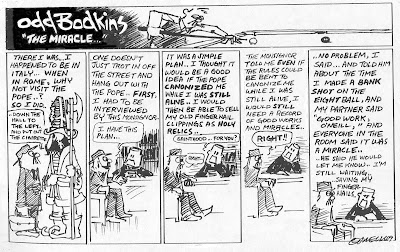 'Isn’t it very striking? The elected officials who led the campaign to end anti-Catholic discrimination in Northern Ireland were not Irish- Americans, but Jewish-Americans, African-Americans, Italian-Americans, Hispanic Americans and others! To me, that is the great moral lesson of the Mac Bride Campaign.'Fr. Seán McManus and Pat Doherty© Fr. Seán McManus
'Isn’t it very striking? The elected officials who led the campaign to end anti-Catholic discrimination in Northern Ireland were not Irish- Americans, but Jewish-Americans, African-Americans, Italian-Americans, Hispanic Americans and others! To me, that is the great moral lesson of the Mac Bride Campaign.'Fr. Seán McManus and Pat Doherty© Fr. Seán McManusFr. Mc Manus is the president of the Capitol Hill-based Irish National Caucus. In November 1984, the Irish National Caucus launched the Principles -- named after Fr. Mc Manus’s good friend and supporter -- Seán Mc Bride, Noble Peace Prize laureate.
Last Tuesday, December 8, Fr. Seán McManus was honoured in the famed City Hall of New York for his work on the MacBride Principles.
The Speaker of the City Council, Christine Quinn, hosted the event. Fr. Mc Manus’s good friend and colleague in the struggle for the Mac Bride Principles, Pat Doherty was also honored.
Doherty has worked for all the NY City Comptrollers since 1984.
Below is Fr. Mc Manus’s acceptance speech.
In 1795 Thomas Paine wrote: “An Army of Principles Will Penetrate Where an Army of Soldiers Cannot” (Agrarian Justice. Pamphlet written in 1795, published in 1797).
I think that perfectly applies to the Mac Bride Principles. The Principles penetrated the previously UNPENETRATABLE bastion of anti-Catholic discrimination -- the Northern Ireland State.
In the early years of our campaign, our opponents used to tell us to mind our own business – they clearly did not subscribe to Martin Luther King’s dictum: “ Injustice anywhere is an affront to justice everywhere”. But when our campaign began to take effect, they stopped telling us to mind our own business – because when Americans make sure that U.S. dollars are not subsidizing anti-Catholic discrimination in Northern Ireland, they are minding their own business.
It is generally accepted that Martin Luther King’s movement would not have succeeded without Jewish-American support. And the Mac Bride Principles would not have succeeded without Jewish-American support.
Just look at the record:
In July 1979, Congressman Ben Gilman (R-NY commissioned the Irish National Caucus to conduct an investigation of the U.S. companies in Northern Ireland.
We then planned to have our principle, “United States dollars should not subsidize anti-Catholic discrimination in Northern Ireland”, enshrined into law. In 1983, Congressman Dick Ottinger introduced Bill HR 3465: “Requiring United States persons who conduct business or control enterprises in Northern Ireland to comply with certain fair employment principles.” We had, of course, modeled the Ottinger Bill on the Sullivan Principles.
Our activity got a lot of attention and soon many State and City officials who wanted to join our campaign contacted us: most notably, New York City Comptroller Harrison J. Goldin and Council Member Sal Albanese (who introduced the very first Mac Bride Bill in the entire United States).
Comptroller Goldin went on to provide magnificent support and economic muscle for the Mac Bride Principles until he left office in 1989. His successors, Liz Holtzman (1990- 1993) and Alan Hevesi (1994-2001), continued to provide indispensable support for the Mac Bride Principles.
My dear friend, Congressman Ben Gilman, Chairman of the House International Relations Committee, championed our campaign in the Congress and the Mac Bride Principles (despite very powerful opposition) became US law in 1998.
So you can easily see the importance of Jewish-American support.
Since 2002, Comptroller Thompson has provided magnificent leadership on the Mac Bride Principles. And here, again, is something that has touched me deeply: the support of African-Americans, who know a thing or two about discrimination. Along with Comptroller Thompson, the other names that immediately come to mind are Congressman Charlie Rangel of New York, one of our very earliest supporters, and Congressman Don Payne of New Jersey.
I have already mentioned Sal Albanese and the key role he played in our campaign. But one cannot mention American activity on behalf of Ireland without mentioning that other great Italian, Congressman Mario Biaggi, who for many ears was our key ally in Congress.
Isn’t it very striking? The elected officials who led the campaign to end anti-Catholic discrimination in Northern Ireland were not Irish- Americans, but Jewish-Americans, African-Americans, Italian-Americans, Hispanic Americans and others! To me, that is the great moral lesson of the Mac Bride Campaign.
God bless America and God save Ireland.
Fr. McManus has written a history of the MacBride Principles campaign:
The MacBride Principles:
Genesis and History
and
The Story to Date
THE DEFINITIVE HISTORY OF THE MACBRIDE PRINCIPLES
The first book to tell the complete story of the MacBride Principles Campaign. 136 pages packed with vitally important details and 24 photos which help to document the story from 1978 to the present.
Available from:
To order, send with your check payable to Irish National Caucus. Cost is $10.00 plus $1.24 for shipping and handling per book.










